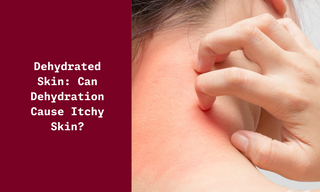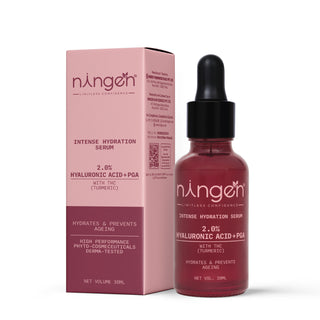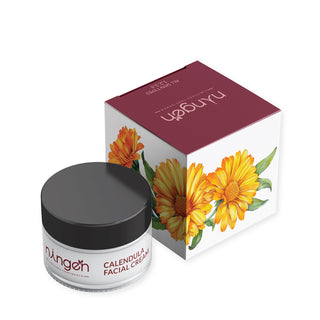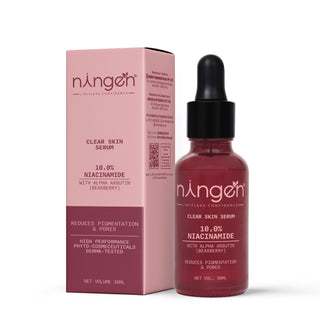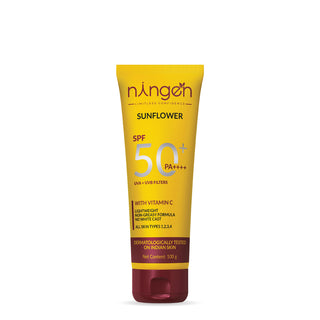Have you ever experienced that annoying itchiness on your skin that just won't seem to go away?
Well, did you know that it could be because your skin is thirsty? Yes, that's right!
We often hear about the importance of staying hydrated for our overall health and well-being. But dehydration can also affect our largest body organ – the skin.
In this comprehensive guide, we'll explore if dehydration causes itchy skin, uncovering how staying hydrated is essential not just for quenching our thirst, but also for keeping our skin happy and healthy.
What Is Dehydration?
Dehydration is when your body doesn't have enough water. When you lose more water than you take in, it can cause dehydration. This can happen if you don't drink enough water, you are exposed to the Sun for a long time, or if you lose too much water through sweating, vomiting, or diarrhea. Dehydration can make you feel thirsty, tired, dizzy, or have dark yellow pee. It can also make your skin dry and your mouth feel dry. Severe dehydration can be dangerous and may need medical help. It's important to stay hydrated and keep your body working well.
Symptoms of Dehydration
Here are the symptoms of dehydration:
- Thirst: Feeling thirsty is one of the most common early signs of dehydration. Your body signals the need for more fluids to maintain proper hydration levels.
- Dark Urine: Dark yellow or amber-colored urine is a sign of concentrated urine, indicating that you may be dehydrated. In a well-hydrated individual, urine is typically light yellow to clear.
- Decreased Urination: Reduced frequency of urination or passing small amounts of urine infrequently can be a sign of dehydration. Healthy individuals typically urinate several times a day.
- Dry Mouth and Lips: Dehydration can cause dryness in the mouth and lips due to reduced saliva production. You may feel parched or have difficulty swallowing.
- Fatigue and Weakness: Lack of proper hydration can lead to feelings of fatigue, weakness, and lethargy. Dehydration affects overall energy levels and can impair physical and mental performance.
- Dizziness or Lightheadedness: Dehydration can cause a drop in blood pressure, leading to feelings of dizziness or lightheadedness, especially upon standing up quickly.
- Headache: Dehydration can trigger headaches or migraines in some individuals. Proper hydration is essential for maintaining optimal blood flow and oxygenation to the brain.
- Dry Skin: Dehydration can manifest as dry, flaky skin due to reduced moisture levels. The skin may feel tight, rough, or irritated.
- Reduced Skin Elasticity: Pinching the skin on the back of your hand and observing how quickly it returns to its normal position can indicate hydration status. Dehydrated skin may take longer to return to its original state.
- Sunken Eyes: Severe dehydration may cause the eyes to appear sunken or hollow due to fluid loss. This is particularly noticeable in the area around the eyes.
- Rapid Heartbeat: Dehydration can lead to an increased heart rate as the body attempts to maintain blood pressure and circulation. This can manifest as palpitations or a sensation of a racing heart.
- Rapid Breathing: In some cases, dehydration can result in shallow or rapid breathing as the body attempts to conserve water.
- Confusion or Irritability: Severe dehydration can affect cognitive function, leading to confusion, difficulty concentrating, or irritability.
- Fainting: In extreme cases of dehydration, loss of consciousness or fainting may occur due to inadequate blood flow to the brain.
It's essential to recognize these symptoms of dehydration and take steps to rehydrate promptly by drinking fluids and, if necessary, seeking medical attention, especially in cases of severe dehydration.
Can Dehydration Cause Itchy Skin?
Before delving into the connection between dehydration and itchy skin, let's first understand what dehydration is and how it impacts our skin. Dehydration occurs when the body loses more fluids than it takes in, leading to an imbalance in fluid levels. This can happen due to various factors, including inadequate fluid intake, excessive sweating, vomiting, diarrhea, or certain medical conditions.
When our bodies become dehydrated, they prioritize the distribution of the limited fluids available to vital organs such as the heart, lungs, and brain. As a result, the skin, which is considered a non-essential organ in terms of survival, receives less hydration, leading to dryness and other related issues.
Dry skin is one of the most common manifestations of dehydration. Without an adequate water supply, the skin loses its natural moisture and becomes dry, tight, and flaky. Over time, prolonged dehydration can weaken the skin's barrier function, making it more susceptible to external irritants and allergens, which can exacerbate itching and discomfort.
So, how exactly does dehydration contribute to itchy skin? The answer lies in the skin's natural protective barrier. The outermost layer of the skin, known as the stratum corneum, acts as a barrier that helps retain moisture and prevent irritants from penetrating the skin.
When the body is dehydrated, the skin's barrier function becomes compromised. As a result, moisture loss accelerates, leading to dryness and inflammation. The lack of hydration also disrupts the skin's pH balance, making it more prone to irritation and itching.
Furthermore, dehydration can trigger the release of histamines in the body. Histamines are chemicals produced by the immune system in response to allergens or other triggers. When histamines are released, they can cause itching, redness, and swelling, further exacerbating the discomfort associated with dry, dehydrated skin.
In addition to external factors, such as weather conditions and environmental pollutants, certain lifestyle habits can also contribute to dehydration and itchy skin. These include:
- Inadequate fluid intake: Not drinking enough water throughout the day can lead to dehydration and dry skin.
- Excessive caffeine or alcohol consumption: Both caffeine and alcohol have diuretic effects, meaning they increase urine production and can contribute to dehydration.
- Hot showers or baths: Prolonged exposure to hot water can strip the skin of its natural oils, leading to dryness and itchiness.
- Harsh skincare products: Using products that contain harsh chemicals or fragrances can strip the skin of its moisture and exacerbate itching and irritation.
Note: If you want to know how to treat dry skin, click on the link.
Preventing and Treating Dehydration-Induced Itchy Skin:
The good news is that dehydration-induced itchy skin is often preventable and manageable with the right approach. Here are some tips to help keep your skin hydrated and itch-free:
- Stay Hydrated: Drink plenty of water throughout the day to maintain optimal hydration levels. Aim for at least eight glasses of water per day, or more if you're physically active or in hot weather.
- Moisturize Regularly: Use a gentle, hydrating moisturizer to replenish moisture in the skin and prevent dryness. Look for products that contain ingredients like hyaluronic acid, glycerin, or ceramides, which help lock in moisture and strengthen the skin barrier.
- Avoid Hot Water: Opt for lukewarm showers or baths instead of hot water, as hot water can strip the skin of its natural oils and worsen dryness and itching.
- Choose Gentle Skincare Products: Use mild, fragrance-free skincare products that are suitable for sensitive skin. Avoid harsh cleansers or exfoliants that can further irritate dry, dehydrated skin.
- Humidify the Air: Use a humidifier in your home, especially during the winter months when indoor heating can dry out the air. Humidifiers help add moisture to the air, which can prevent skin dehydration and itching.
- Protect Your Skin: Apply a broad-spectrum sunscreen with SPF 30 or higher when going outside to protect your skin from the sun's harmful UV rays. Sun exposure can further dehydrate the skin and exacerbate itching and irritation.
- Address Underlying Health Conditions: If you have chronic dehydration or underlying health conditions contributing to itchy skin, such as eczema or psoriasis, consult with a healthcare professional for proper diagnosis and treatment.
Note: read our other article on how to get rid of dry skin.
Skincare That Helps Dehydrated Skin
For dehydrated skin, it's essential to focus on skincare products that provide intense hydration and support the skin's moisture barrier. Here are some key skincare ingredients and products that can help:
- Hyaluronic Acid: Hyaluronic acid is a humectant that attracts and retains moisture in the skin, helping to hydrate and plump the skin. Look for moisturizers, serums, or masks containing hyaluronic acid to boost hydration levels.
- Glycerin: Glycerin is another humectant that draws moisture into the skin and helps maintain hydration. Look for skincare products with glycerin as a key ingredient to help replenish moisture in dehydrated skin.
- Ceramides: Ceramides are lipids that help form the skin's barrier and prevent moisture loss. Skincare products containing ceramides can help strengthen the skin's barrier function and improve hydration levels.
- Niacinamide: Niacinamide, also known as vitamin B3, has hydrating and barrier-strengthening properties. It helps improve the skin's moisture retention and can also reduce inflammation and redness.
- Moisturizers: Choose moisturizers specifically formulated for dry skin. Look for rich, creamy formulas that provide long-lasting hydration without feeling heavy or greasy.
- Facial Oils: Facial oils can help lock in moisture and nourish the skin. Opt for lightweight, non-comedogenic oils such as argan oil, jojoba oil, or squalane to replenish hydration in dehydrated skin.
- Humidifiers: Using a humidifier in your home can add moisture to the air and help prevent dehydration of the skin, especially during dry or cold weather.
- Avoid Harsh Ingredients: Avoid skincare products containing alcohol, fragrances, or other harsh ingredients that can strip the skin of its natural oils and further dehydrate the skin.
- Sunscreen: Protect your skin from further dehydration and damage by wearing a broad-spectrum sunscreen every day. Choose a moisturizing sunscreen with at least SPF 30 to hydrate and protect the skin from UV rays.
- Drink Water: In addition to topical skincare products, don't forget to hydrate your skin from the inside out by drinking plenty of water throughout the day. Aim for at least eight glasses of water per day to maintain optimal hydration levels.
By incorporating these hydrating skincare products and practices into your routine, you can help replenish moisture in dehydrated skin and achieve a healthy, hydrated complexion. However, if you have persistent concerns about your skin's hydration or if your skin condition worsens, it's essential to consult with a dermatologist for personalized recommendations and treatment options.
Discover our thoughtfully curated collection of skincare products crafted with products that help rehydrate the skin. Explore the carefully chosen items featured in the dedicated section below.
Bottom Line:
Hope you found our article Can dehydration cause itchy skin helpful. The connection between dehydration and itchy skin is undeniable. As we've explored throughout this article, dehydration can significantly impact the health and appearance of our skin, leading to dryness, irritation, and persistent itch. By understanding the importance of staying hydrated and recognizing the signs of dehydration, we can take proactive steps to keep our skin happy and healthy.
Remember, maintaining adequate hydration is not just essential for quenching our thirst but also for nourishing our skin from within. By drinking enough water, moisturizing regularly, and adopting healthy hydration habits, we can help prevent dehydration and minimize the risk of itchy skin.
Hydrating your body is one of the simplest and most effective ways to keep your skin hydrated, itch-free, and glowing with health.
Cheers to happy, hydrated skin!
Frequently Asked Questions (FAQ'S)
Question 1: What is dehydration, and how does it relate to skin health?
Answer: Dehydration occurs when the body loses more fluids than it takes in, impacting various bodily functions, including skin health. When dehydrated, the skin may become dry, tight, and more prone to itching.
Question 2: Can dehydration cause itchy skin?
Answer: Yes, dehydration can lead to itchy skin. When the body lacks proper hydration, the skin's natural moisture barrier weakens, making it more susceptible to dryness and irritation, which can manifest as itching.
Question 3: What are the signs of dehydration-induced itchy skin?
Answer: Signs of dehydration-induced itchy skin may include dryness, flakiness, redness, and a persistent urge to scratch. Itchy skin may be accompanied by other symptoms of dehydration, such as thirst, dark urine, and fatigue.
Question 4: How does dehydration affect the skin's moisture barrier?
Answer: Dehydration compromises the skin's moisture barrier, which normally helps retain water and protect against external irritants. When dehydrated, the skin loses moisture more quickly, leading to dryness and increased susceptibility to itching.
Question 5: Can drinking more water help relieve itchy skin caused by dehydration?
Answer: Yes, staying hydrated by drinking enough water throughout the day can help alleviate itchy skin caused by dehydration. Proper hydration supports skin health and helps maintain the skin's moisture balance.
Question 6: What other factors can contribute to itchy skin besides dehydration?
Answer: Besides dehydration, factors such as dry air, harsh skincare products, allergies, skin conditions like eczema or psoriasis, and certain medications can also contribute to itchy skin.
Question 7: How can I prevent dehydration-induced itchy skin?
Answer: Prevent dehydration-induced itchy skin by drinking an adequate amount of water daily, moisturizing regularly with hydrating skincare products, avoiding prolonged exposure to hot water, and using a humidifier in dry indoor environments.
Question 8: Are there specific skincare products that can help relieve dehydration-induced itchy skin?
Answer: Yes, moisturizers containing hydrating ingredients such as hyaluronic acid, glycerin, and ceramides can help replenish moisture in dehydrated skin and alleviate itching. Additionally, soothing ingredients like aloe vera and oat extract may provide relief.
Question 9: Can dehydration-induced itchy skin be a sign of a more serious health condition?
Answer: In some cases, persistent or severe dehydration-induced itchy skin may be a sign of an underlying health issue. If itching persists despite hydration efforts or is accompanied by other concerning symptoms, it's advisable to consult a healthcare professional for evaluation.
Question 10: How long does it take for hydration to relieve itchy skin?
Answer: Hydration can provide relief for itchy skin caused by dehydration relatively quickly, often within a few days of increasing water intake and using hydrating skincare products. However, individual response times may vary depending on the severity of dehydration and other contributing factors.


